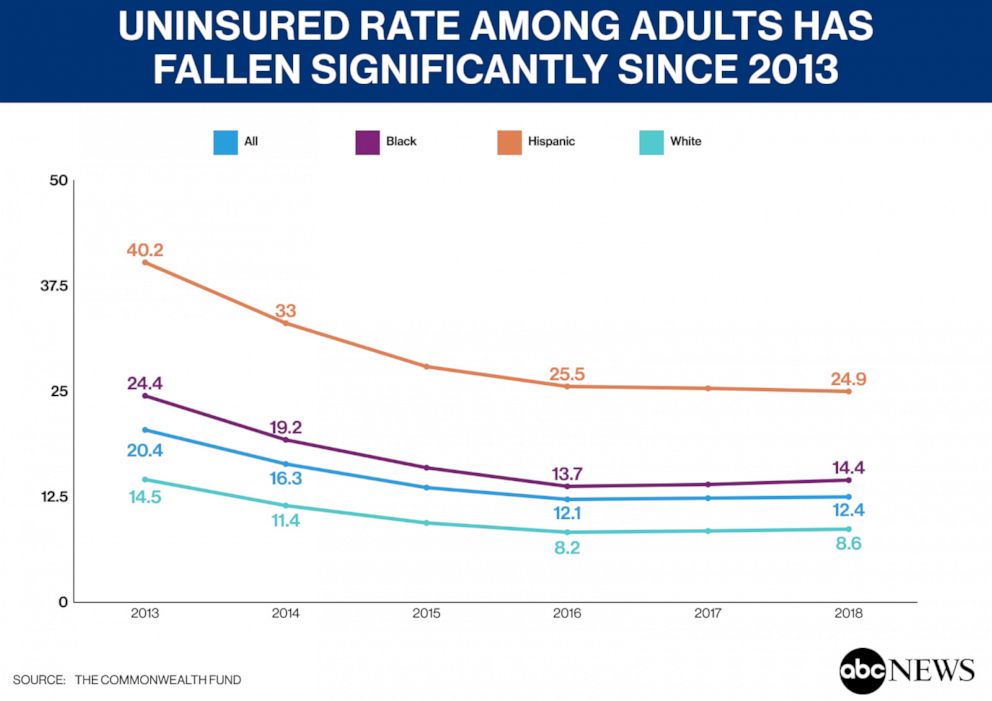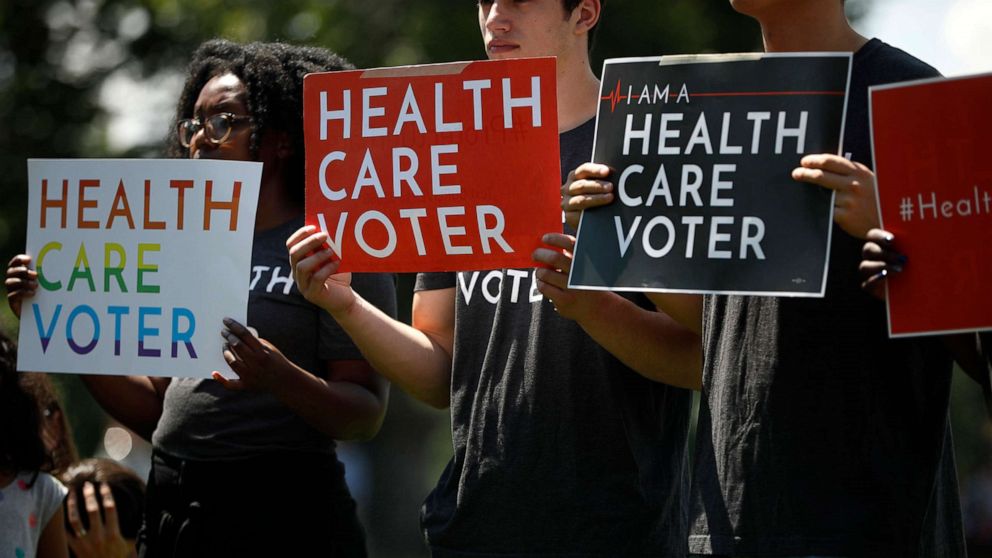Progress stalled on ultimate racial gap in medical health insurance on the grounds that Trump took workplace
Health care disparities have not improved considering the fact that 2016.
While the Affordable Care Act ushered in large upgrades in get entry to to fitness care for black and Hispanic adults within the United States, that progress appears to have stalled, consistent with new research.
Between 2013 and 2016, the uninsured price dropped from 24.4% to 13.7% amongst black adults, and from forty.2% to 25.Five% among Hispanic adults, in keeping with a report published Thursday with the aid of the Commonwealth Fund, a nonprofit studies basis. Uninsured white Americans dropped from 14.Five% to 8.2% during the equal period.
Those profits narrowed the space in coverage insurance between Americans of shade and white Americans till 2016. Beginning that year, that development came to a halt, with the gap growing slightly for blacks and simplest reducing barely for Hispanics with the aid of 2018.

The observe tested federal survey statistics among 2013 and 2018 from adults a long time 18 to 64, to determine how the ACA affected racial and ethnic disparities in fitness care.
"Historically, black and Hispanics in the U.S. Have been a long way less probably to have medical health insurance," stated Sara Collins, vp of fitness care coverage and get right of entry to on the Commonwealth Fund. She pointed to the adjustments in insurance prices for the reason that ACA went into effect, which made it less complicated for people, particularly low-profits Americans, to get fitness care.
While disparities among black and white adults decreased, there may be been "no improvement in this hole due to the fact 2016," she harassed.
That turning factor may be connected to in component to congressional inactivity, consistent with the researchers. Since 2010, there is been no federal regulation to enhance the fitness care regulation and myriad efforts to dismantle it. Weakening efforts encompass repealing the character mandate penalty for having health care insurance and loosening regulations on plans that do not follow ACA pointers.
While disparities between black and white adults reduced, there is been "no development in this hole when you consider that 2016," she confused.
That turning point can be related to in part to congressional inactiveness, in step with the researchers. Since 2010, there is been no federal rules to enhance the health care regulation and myriad efforts to dismantle it. Weakening efforts encompass repealing the character mandate penalty for having health care coverage and loosening restrictions on plans that don't follow ACA hints.

In addition to inspecting the price of uninsured adults, a key measure of health care access, the researchers also checked out Americans who went with out health care due to cost at some point of the previous 12 months, as well as whether or not survey respondents stated they had a ordinary fitness care company.
In each cases, the researchers located enhancements within the years after the ACA become carried out. Fewer adults in every racial organization pronounced warding off fitness care because of high costs among 2013 and 2018, and greater adults suggested having a everyday fitness care company at some point of the identical time frame. Similar to coverage quotes, however, adults reporting consistent company care tapered off after 2016, and via 2018 had decreased barely.
One key motive force of what Collins referred to as "ancient enhancements" in fitness care get admission to was Medicaid enlargement beneath the Affordable Care Act. But whilst all states had the choice to increase this system, many have chosen no longer to accomplish that.
In states that did amplify, black and Hispanic Americans benefited the most of any racial organization, the report determined. In flip, in states that did now not make bigger their Medicaid packages, those businesses suffered more from the decision. Expanded Medicaid isn't always available to "almost half of of black adults and more than a 3rd of Hispanics," who disproportionately stay in non-expansion states, in keeping with the document.
"This means that the failure to make bigger Medicaid inside the final 15 states has a larger impact on black and Hispanic populations," said Jesse Baumgartner, a research companion on the Commonwealth Fund.
While the Affordable Care Act ushered in large upgrades in get entry to to fitness care for black and Hispanic adults within the United States, that progress appears to have stalled, consistent with new research.
Between 2013 and 2016, the uninsured price dropped from 24.4% to 13.7% amongst black adults, and from forty.2% to 25.Five% among Hispanic adults, in keeping with a report published Thursday with the aid of the Commonwealth Fund, a nonprofit studies basis. Uninsured white Americans dropped from 14.Five% to 8.2% during the equal period.
Those profits narrowed the space in coverage insurance between Americans of shade and white Americans till 2016. Beginning that year, that development came to a halt, with the gap growing slightly for blacks and simplest reducing barely for Hispanics with the aid of 2018.

The observe tested federal survey statistics among 2013 and 2018 from adults a long time 18 to 64, to determine how the ACA affected racial and ethnic disparities in fitness care.
"Historically, black and Hispanics in the U.S. Have been a long way less probably to have medical health insurance," stated Sara Collins, vp of fitness care coverage and get right of entry to on the Commonwealth Fund. She pointed to the adjustments in insurance prices for the reason that ACA went into effect, which made it less complicated for people, particularly low-profits Americans, to get fitness care.
While disparities among black and white adults decreased, there may be been "no improvement in this hole due to the fact 2016," she harassed.
That turning factor may be connected to in component to congressional inactivity, consistent with the researchers. Since 2010, there is been no federal regulation to enhance the fitness care regulation and myriad efforts to dismantle it. Weakening efforts encompass repealing the character mandate penalty for having health care insurance and loosening regulations on plans that do not follow ACA pointers.
While disparities between black and white adults reduced, there is been "no development in this hole when you consider that 2016," she confused.
That turning point can be related to in part to congressional inactiveness, in step with the researchers. Since 2010, there is been no federal rules to enhance the health care regulation and myriad efforts to dismantle it. Weakening efforts encompass repealing the character mandate penalty for having health care coverage and loosening restrictions on plans that don't follow ACA hints.

In addition to inspecting the price of uninsured adults, a key measure of health care access, the researchers also checked out Americans who went with out health care due to cost at some point of the previous 12 months, as well as whether or not survey respondents stated they had a ordinary fitness care company.
In each cases, the researchers located enhancements within the years after the ACA become carried out. Fewer adults in every racial organization pronounced warding off fitness care because of high costs among 2013 and 2018, and greater adults suggested having a everyday fitness care company at some point of the identical time frame. Similar to coverage quotes, however, adults reporting consistent company care tapered off after 2016, and via 2018 had decreased barely.
One key motive force of what Collins referred to as "ancient enhancements" in fitness care get admission to was Medicaid enlargement beneath the Affordable Care Act. But whilst all states had the choice to increase this system, many have chosen no longer to accomplish that.
In states that did amplify, black and Hispanic Americans benefited the most of any racial organization, the report determined. In flip, in states that did now not make bigger their Medicaid packages, those businesses suffered more from the decision. Expanded Medicaid isn't always available to "almost half of of black adults and more than a 3rd of Hispanics," who disproportionately stay in non-expansion states, in keeping with the document.
"This means that the failure to make bigger Medicaid inside the final 15 states has a larger impact on black and Hispanic populations," said Jesse Baumgartner, a research companion on the Commonwealth Fund.
Comentários
Postar um comentário